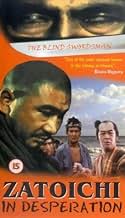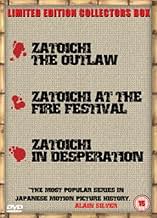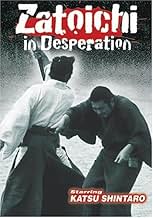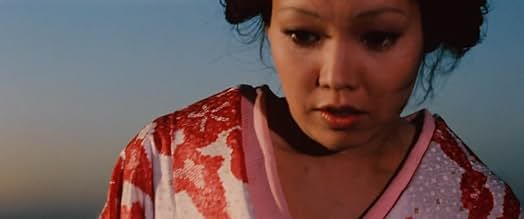La Légende de Zatoïchi : La blessure
Original title: Shin Zatôichi monogatari: Oreta tsue
IMDb RATING
6.8/10
1.2K
YOUR RATING
After accidentally causing an old lady's death, Zatoichi seeks out her daughter to atone for the tragedy, consequently getting into all sorts of trouble.After accidentally causing an old lady's death, Zatoichi seeks out her daughter to atone for the tragedy, consequently getting into all sorts of trouble.After accidentally causing an old lady's death, Zatoichi seeks out her daughter to atone for the tragedy, consequently getting into all sorts of trouble.
- Director
- Writers
- Stars
- Director
- Writers
- All cast & crew
- Production, box office & more at IMDbPro
Featured reviews
I am new to the Zatoichi film series; this was the first film in the series I have seen, after buying a couple of seasons of the TV series and enjoying them. If the rest of the series is as good as this one then I can see I am in for a virtual lifetime of great Zatoichi films - when I can find them in video stores!
"Zatoichi in Desperation" is darker and as another reviewer said, more "heavy handed" than the TV episodes I have seen. The characters - the prostitute given a tentative freedom, the fishermen from the village harassed by the local yakuza gang, the 14-year-old girl about to be forced to work in the brothel and her little brother - are memorable and tragic. Their lives become intertwined with Zatoichi's by a twist of fate - an old woman who accidentally falls from a bridge, and Zatoichi's guilt resulting over it.
This intertwining of relationships, Zatoichi's humbleness despite his master swordsmanship, and the great photography is what makes the film (and the Zatoichi series!) special.
"Zatoichi in Desperation" is darker and as another reviewer said, more "heavy handed" than the TV episodes I have seen. The characters - the prostitute given a tentative freedom, the fishermen from the village harassed by the local yakuza gang, the 14-year-old girl about to be forced to work in the brothel and her little brother - are memorable and tragic. Their lives become intertwined with Zatoichi's by a twist of fate - an old woman who accidentally falls from a bridge, and Zatoichi's guilt resulting over it.
This intertwining of relationships, Zatoichi's humbleness despite his master swordsmanship, and the great photography is what makes the film (and the Zatoichi series!) special.
The following review is an extract from the book "Shintaro Katsu´s Zatoichi: Complete guide to all movies", which is now available on Amazon.
Zatoichi crosses a bridge with a woman who plays the shamisen. The old woman warns him to be careful, for the wood of the bridge has holes, and it is easy to fall if one does not pay attention. The two talk briefly, and the lady asks the blind man where he is going. "Nowhere in particular, wherever the wind takes me", replies the wandering masseur. The old woman replies that she intends to visit her daughter, who works in a geisha house called Ogiya in a nearby town. Moments after they have said goodbye, the blind man has the idea of offering some coins to the old woman, as a tip for playing the shamisen so well... The grateful woman is about to take the coins, but distracted by the surprising gift, slips, loses her balance and falls into the void... She, who had recommended to the blind man to be very careful.
Zatoichi feels guilty for the deadly accident of the poor woman. Unlike its owner, the instrument has remained on the bridge and the masseur picks it up. With the shamisen he walks towards the city of which the deceased spoke to him, to look for his daughter, the geisha, in Ogiya.
(...)
This, the 24th and penultimate, is one of the two films in the saga directed by actor Shintaro Katsu himself, who also acted as co-producer. The other, also directed by Katsu, is the last of the originals (called "Zatoichi" just like that), which was filmed many years later - in 1989 - and where you can see an already grayed and almost old Ichi.
"Zatoichi in desperation", as its title already indicates, is fraught with deep pessimism. Oppressive and dark, sad, depressing and hopeless. Tragically and emotionally brutal.
It also has an undeniable poetic undertone.
Zatoichi crosses a bridge with a woman who plays the shamisen. The old woman warns him to be careful, for the wood of the bridge has holes, and it is easy to fall if one does not pay attention. The two talk briefly, and the lady asks the blind man where he is going. "Nowhere in particular, wherever the wind takes me", replies the wandering masseur. The old woman replies that she intends to visit her daughter, who works in a geisha house called Ogiya in a nearby town. Moments after they have said goodbye, the blind man has the idea of offering some coins to the old woman, as a tip for playing the shamisen so well... The grateful woman is about to take the coins, but distracted by the surprising gift, slips, loses her balance and falls into the void... She, who had recommended to the blind man to be very careful.
Zatoichi feels guilty for the deadly accident of the poor woman. Unlike its owner, the instrument has remained on the bridge and the masseur picks it up. With the shamisen he walks towards the city of which the deceased spoke to him, to look for his daughter, the geisha, in Ogiya.
(...)
This, the 24th and penultimate, is one of the two films in the saga directed by actor Shintaro Katsu himself, who also acted as co-producer. The other, also directed by Katsu, is the last of the originals (called "Zatoichi" just like that), which was filmed many years later - in 1989 - and where you can see an already grayed and almost old Ichi.
"Zatoichi in desperation", as its title already indicates, is fraught with deep pessimism. Oppressive and dark, sad, depressing and hopeless. Tragically and emotionally brutal.
It also has an undeniable poetic undertone.
This is the best one, number 24. Ichi realizes that he is not a hero, is making everyone's lives ultimately more violent and difficult than it would have without his existence. He is physically punished for this and still dispatches 20 dudes without using his hands.
If you don't like mean people, you know, actually effective villains, this one might make your little sensitivities buzz. The moral philosophy Katsu evaluates is artful and considerate. This is a brutal, dark, and ballsy entry.
If you don't like mean people, you know, actually effective villains, this one might make your little sensitivities buzz. The moral philosophy Katsu evaluates is artful and considerate. This is a brutal, dark, and ballsy entry.
Zatoichi in Desperation is the most somber and darkest Zatoichi film that I have seen in the series, both in terms of photography and plot. It's interesting that Shintaro Katsu, who plays Zatoichi, was the director. He was certainly going for a different look and style and got it. Most of the scenes are darkly lit and there is a claustrophobic feeling to the shots. The bad guys, composed of the local yakuza (gangster) mob, are meaner than usual and the body count of innocent villagers is far higher than usual. Zatoichi himself also suffers more at the hands of the evil doers than usual. This was the next to last entry (#24) in the series before the 17 year hiatus between #25 and 26. Things get back into the more typical Zatoichi style in #25. This film would have been appropriate as the last in the series. It has the feeling of "an ending". A very interesting entry, but not one of my favorites. As always, recommended for Zatoichi fans.
It started up well, yet, at a certain point the script turned to a level of imbecility comparable with a big studio US creation. Well, compared with the level of the US Academy this can easily can take an Oscar for best script.
On the other hand this movie achieves something almost unique. The visual style is so unusual (especially for somebody used with the standard blockbuster) that both makes the film unforgettable and hard to watch. In my opinion this is what Mean Streets and The Killing of a Chinese Bookie should have looked like if the tech team involved would have been skilled enough. The gambling scene alone makes Rounders look like a half baked high-school project (which is not far from the truth anyway).
A 6 for cramming so much into this movie. You have a social message, the indolence of the rich (the young watching the fishermen's boats burn), the unromaticised noblemen, etc.
Contact me with Questions, Comments or Suggestions ryitfork @ bitmail.ch
On the other hand this movie achieves something almost unique. The visual style is so unusual (especially for somebody used with the standard blockbuster) that both makes the film unforgettable and hard to watch. In my opinion this is what Mean Streets and The Killing of a Chinese Bookie should have looked like if the tech team involved would have been skilled enough. The gambling scene alone makes Rounders look like a half baked high-school project (which is not far from the truth anyway).
A 6 for cramming so much into this movie. You have a social message, the indolence of the rich (the young watching the fishermen's boats burn), the unromaticised noblemen, etc.
Contact me with Questions, Comments or Suggestions ryitfork @ bitmail.ch
Did you know
- TriviaOnly film in the original series directed by Zatoichi himself, Shintarô Katsu. He would go on to direct one more, La légende de Zatoïchi - L'odyssée finale (1989).
- Quotes
Boss Mangoro Kagiya: Please enjoy watching as Zatoichi meets his end.
- ConnectionsFollowed by Mang jian xue di zi (1973)
- How long is Zatoichi in Desperation?Powered by Alexa
Details
- Release date
- Country of origin
- Language
- Also known as
- Zatoichi in Desperation
- Production companies
- See more company credits at IMDbPro
- Runtime1 hour 35 minutes
- Sound mix
- Aspect ratio
- 2.35 : 1
Contribute to this page
Suggest an edit or add missing content

Top Gap
By what name was La Légende de Zatoïchi : La blessure (1972) officially released in India in English?
Answer





























